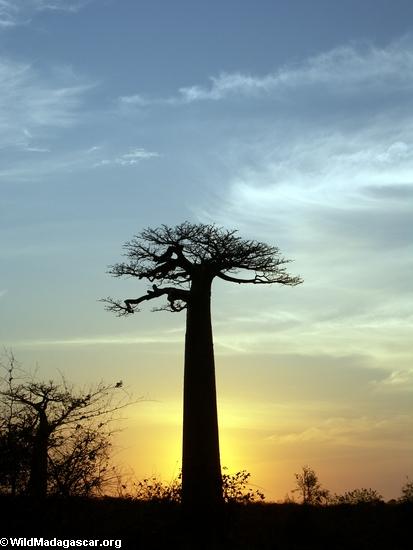
Babobab in western Madagascar, near Morondava. Photo by Rhett A. Butler, 2004
Madagascar is renowned for its biological richness. Located off the eastern coast of southern Africa and slightly larger than California, the island has an eclectic collection of plants and animals, more than 80 percent of which are found nowhere else in the world.
Madagascar is home to such evolutionary oddities as the fossa, a carnivorous mammal that looks like a cross between a puma and a dog but is closely related to the mongoose; the indri, a cat-sized lemur whose haunting song resembles that of the humpback whale; the sifaka, a lemur that “swears” rudely but moves across open ground like a ballet dancer; brilliantly colored chameleons and day geckos; and cryptic leaf-tailed geckos, which are nearly impossible to distinguish from bark or moss. It has baobab trees, which look like they’ve been planted upside down; the rosy periwinkle, a delicate flower used to cure pediatric leukemia and Hodgkin’s disease; and an entire desert ecosystem consisting of just spiny plants, none of which are cacti. Accordingly, scientists have made the island—dubbed the Eighth Continent—a top conservation priority.
But Madagascar’s biological bounty has been under siege for nearly a year in the aftermath of a political crisis which saw its president chased into exile at gunpoint; a collapse in its civil service, including its park management system; and evaporation of donor funds which provide half the government’s annual budget. In the absence of governance, organized gangs ransacked the island’s biological treasures, including precious hardwoods and endangered lemurs from protected rainforests, and frightened away tourists, who provide a critical economic incentive for conservation. Now, as the coup leaders take an increasingly active role in the plunder as a means to finance an upcoming election they hope will legitimize their power grab, the question becomes whether Madagascar’s once highly regarded conservation system can be restored and maintained.







